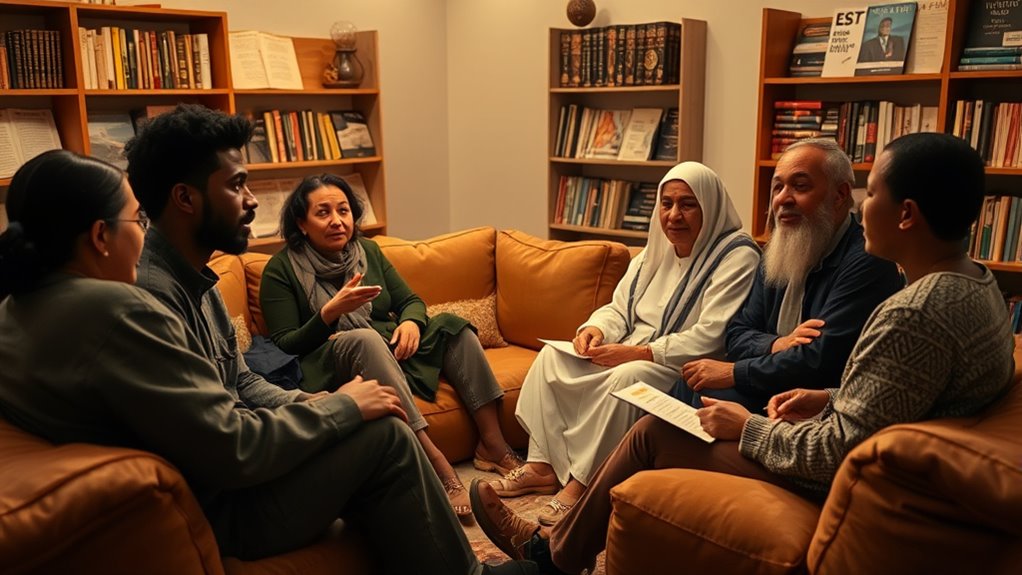When tackling tough conversations about religion and politics, it’s important to foster understanding and respect. Set clear boundaries, actively listen, and approach topics with empathy. Creating safe spaces for open dialogue helps break stereotypes and builds mutual respect. Focus on shared values and aim for peaceful coexistence. Encouraging diverse perspectives through respectful discussion can reduce tensions. If you want to learn more about managing these sensitive topics effectively, you’ll find simple strategies that promote constructive and safe exchanges.
Key Takeaways
- Create safe, respectful spaces for open dialogue to prevent misunderstandings and encourage honest conversations.
- Use active listening, empathy, and clear boundaries to facilitate constructive discussions on sensitive topics.
- Promote interfaith and intercultural dialogue to build mutual understanding and break down stereotypes.
- Balance secular governance with respect for religious beliefs to maintain social harmony and inclusivity.
- Emphasize shared values and common goals to foster patience, respect, and progress in contentious debates.

Religion and politics often collide in ways that spark intense debate and controversy, touching on deeply held beliefs and societal values. Managing these tensions requires more than just knowledge; it demands skill in fostering understanding, especially when discussing sensitive topics. One effective approach is engaging in interfaith dialogue, which creates a safe space for people of different beliefs to share perspectives and find common ground. These conversations help break down stereotypes and build mutual respect, essential for maintaining social cohesion in diverse communities. When you participate in or facilitate interfaith dialogue, you contribute to a culture where differences are acknowledged without fear or hostility. This process becomes even more vital in societies that emphasize secular governance, where separating religion from state matters can be complex but essential for fairness and inclusivity. You might wonder how to balance respecting religious identities while upholding secular principles. The key is to recognize that secular governance doesn’t mean excluding religion but ensuring that public policy remains neutral and inclusive. When religion enters the political arena, it can threaten this neutrality, leading to conflicts or marginalizing minority groups. By promoting open and respectful conversations about these issues, you help create a political climate where diverse beliefs coexist peacefully. Setting clear boundaries during discussions helps avoid crossing into personal attacks or dogmatism, fostering a climate where everyone feels heard. It’s crucial to listen actively and ask questions rather than make assumptions, which encourages genuine understanding. When emotions run high, recalling the shared goal of mutual respect helps de-escalate tensions. Remember, having hard talks safely doesn’t mean avoiding difficult topics but approaching them with empathy and openness. You can also advocate for policies that support religious freedom and equal rights, reinforcing the importance of secular governance as a foundation for societal stability. In doing so, you help bridge divides, making conversations about religion and politics more constructive rather than confrontational. Creating spaces for honest dialogue and emphasizing common values can transform contentious issues into opportunities for growth and understanding. When you engage thoughtfully, you foster a climate where diversity is seen as a strength, not a threat. Ultimately, steering the intersection of religion and politics involves patience, respect, and a willingness to listen. By promoting interfaith dialogue and supporting secular governance, you contribute to a more tolerant, inclusive society where difficult conversations lead to progress, not polarization.
Frequently Asked Questions
How Can I Start a Difficult Conversation Without Offending Others?
When starting a difficult conversation, you should focus on tone management and nonverbal cues to set a respectful atmosphere. Begin with a calm voice and open body language, showing you’re listening and open-minded. Express your intentions honestly but gently, emphasizing understanding rather than confrontation. By maintaining positive nonverbal cues and a considerate tone, you help prevent offending others and encourage a constructive dialogue.
What Are the Best Strategies for Active Listening During Heated Debates?
When it comes to heated debates, you need to really listen to succeed. Pay attention to nonverbal cues like body language and facial expressions to gauge emotions. Show emotional validation by acknowledging their feelings without judgment. Stay present, avoid interrupting, and ask clarifying questions. Remember, you catch more flies with honey than vinegar, so maintain a respectful tone and keep your focus on understanding their perspective.
How Do Cultural Differences Impact Discussions on Sensitive Topics?
When discussing sensitive topics, cultural differences greatly influence how you communicate and interpret others’ views. You should practice cultural sensitivity by being aware of diverse perspectives and avoiding assumptions. By actively listening and showing respect for different backgrounds, you create a safe space for open dialogue. Recognizing these differences helps prevent misunderstandings, encourages empathy, and fosters more meaningful conversations, even on challenging subjects.
What Role Does Empathy Play in Managing Conflict About Religion or Politics?
Empathy is the bridge over turbulent waters, guiding you through conflict with understanding. It plays a crucial role in managing disagreements about sensitive topics by fostering emotional intelligence and helping you see others’ perspectives. When you develop empathy, you create space for respectful dialogue, reducing hostility and opening pathways for common ground. Your ability to connect emotionally makes difficult conversations safer and more productive, turning conflicts into opportunities for growth.
How Can I Maintain Friendships After Disagreements on Hot-Button Issues?
You can maintain friendships after disagreements by focusing on compromise solutions and respecting emotional boundaries. When discussions get heated, prioritize listening and understanding rather than winning. Set clear boundaries to protect your feelings and those of your friends, and agree to pause conversations if needed. Remember, maintaining respect and empathy helps preserve your relationship, even when opinions differ. It’s about valuing your friendship more than being right on every issue.
Conclusion
Guiding tough conversations about religion and politics can feel like walking a tightrope, balancing passion with respect. Yet, when you approach these hot potatoes thoughtfully, you create space for understanding instead of division. It’s like holding a fragile flame—delicate, but powerful enough to warm or burn. By choosing kindness over conflict, you turn potential sparks into sparks of connection, proving that even the most heated topics can be discussed safely when you lead with empathy.










